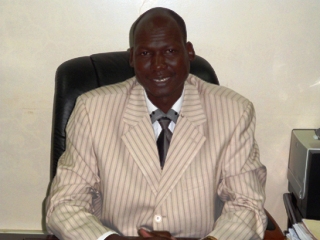Governor of newly created Latjor state appoints cabinet ministers
February 28, 2016 (JUBA) – Peter Lam Both, governor of a newly established Latjor state, has announced appointment of his deputy, advisers and cabinet ministers, ending months of political lobbying among politicians seeking either community or party support for nomination to various positions in the state.

Among the newly appointed state cabinet ministers include Gach Wol Guandong as minister for local government and law enforcement and Peter Hoth Tuach to continue as minister of information, culture, youth and sports, a position he partially held from the previous undivided Upper Nile state.
Yien Bol Mayuak has become minister of finance and public service while Nyakong Daniel Banak is appointed minister of agriculture and forestry. Nyaruach Pal Gai as minister of health and environment; Moses Gai Samuel as minister of education, gender and social welfare and Bol Puot Yut has taken the position of minister of physical infrastructure.
Three advisers appointed include John Kor Dieu, advisor for political affairs, Tut Gatchai Lual as advisor for security and Buk Lul Joak as advisor for peace and reconciliation.
Four county commissioners appointed were Gatkuoth Biem Nyoak for Ulang county, John Monyany Lual for Longechuk county, Paul Biel Chuol for Maiwut county and General Gatwech Jock Deng for Nasir county.
Latjor state is one of the controversial 28 states created by President Salva Kiir by a decree but which has been widely challenged as unconstitutional by a coalition of opposition political parties in the country.
Peace monitors and guarantors of the August 2015 peace agreement between warring parties in the 21 months of the civil war have condemned the unilateral creation of the 28 states by the government as a “violation” of the peace deal, which is based on the constitutionally recognized 10 states.
President Kiir and his supporters however claimed that the unilateral decision was a “demand of the people” but could not explain the reason they rejected a similar proposal to create 21 states by the armed opposition faction of the Sudan People’s Liberation Movement (SPLM-IO) led by Riek Machar, who also claimed it was a demand of the people.
The government also failed to table a counter proposal to create 28 states during the peace negotiations, but instead rejected any creation of new states.
However, the fate of the 28 states remains unclear as they will be suspended immediately once a transitional government of national unity (TGoNU) is formed any time soon in March, according to a communiqué released by the East African regional bloc, IGAD, which mediated the peace deal.
The 28 states, which are established in form of tribal enclaves in Upper Nile region, have also threatened to open up violent conflicts between neighbouring communities over lands claimed to have been taken from others and given to another ethnic group to form new states.
Also, states such as Latjor, which has been curved from the oil rich Upper Nile state, one of the three states including Jonglei and Unity in Upper Nile region, will be governed by the SPLM-IO governors. This means the new governor of Latjor state and others in the region and their cabinets will be dissolved in weeks from now before they can barely start to do anything tangible in the states.
After forming TGoNU and suspending the 28 states, the parties to the peace agreement will establish a boundary commission to work on a number of new states to be created as well as their boundaries within a month from TGoNU formation. If they disagree, they will revert to the current 10 states as in the peace deal.
A process of debate to create new states and establish a federal system of governance will however continue under the TGoNU where various proposals such as the 10, 21 and 28 states will be tabled by the parties for consensus.
(ST)
